CORONAVIRUS is forcing the industry to change, whether we like it or not. The havoc being wreaked by the dreaded “c-word” means it’s tempting to just curl up into a ball and wait until the storm is over. But some in the industry are getting on the front foot instead and meeting the challenges head on with new products and in some cases a completely new way of doing business. travelBulletin checked out some of these innovations.
Bunnik Tours
Heeding the winds of change
While many travel businesses have chosen to pivot towards launching new product during the health crisis, family-owned small group operator Bunnik Tours has opted instead to breathe new life into the sector by launching a new business arm called Little Windmill Marketing.
Leveraging existing expertise within the business, Little Windmill Marketing was set up to assist travel companies with a host of important marketing functions, such as strategic planning, digital media campaigns, content creation, branding, graphic design and website development.
Heading up the new division is Bunnik’s Director of Marketing Catherine Kelly, who believes the new splinter company will provide an essential service to an array of small to medium-sized travel businesses who require the right expertise to emerge from the pandemic in good shape.

“We recognise that a lot of small to midsize companies in the travel industry are faced with the need to come out of lockdown in a really impactful way but may not have the marketing resources and know-how or the big budgets to capitalise on the opportunity,” she said.
Addressing the need to adapt to the dramatic change in the marketplace precipitated by COVID-19, Kelly said honesty and an audit of Bunnik’s strengths were vital in making the right decision about what to do next.
“This was part of a speedy pivot to adapt, speedy but with plenty of frank discussions and planning sessions to make it meaningful and worthwhile, prior to COVID-19 we were operating in-house but as some projects have slowed we felt there was an opportunity with our time and skillset to offer what we do externally,” Kelly said.
“At Bunnik Tours we’ve always handled the majority of our marketing functions in-house which has meant that we have a highly skilled team of marketers who are knowledgeable across multiple channels”.
To mark its launch, Little Windmill Marketing is offering a bonus social media package valued at $495 for any client who spends more than $1,000 on its services.
APT
Domestic double-down
APT is an operator which already has its roots deep in the domestic market, but despite its existing offering has seen an opportunity to expand with the launch of a new Luxury Short Breaks range. With multi-night stays at some of Australia’s most exclusive hotels and lodges, the fully escorted trips include travel onboard APT’s own fleet of customised luxury 4WD adventure vehicles, in small groups with a maximum of 20 people.
Managing Director Chris Hall told travelBulletin the new touring style also incorporated no more than three stops per trip, giving more time for intimate explorations of some of Australia’s most spectacular and remote regions in “world class style”.
“As we all know the travel industry has changed dramatically, and our priority now is to create incredible experiences that are possible in this new travel landscape,” he said. The initial range includes a six-day Margaret River 4WD exploration staying at the exclusive Bunker Bay Resort, a week-long South Australia Flinders Ranges & Wineries trip which includes two nights ‘glamping’ at the Ikari Safari Camp in Wilpena Pound, and a six-day Tasmanian Epicurean 4WD Escape including two nights at Saffire Freycinet and three nights at Hobart’s upmarket Henry Jones Art Hotel.
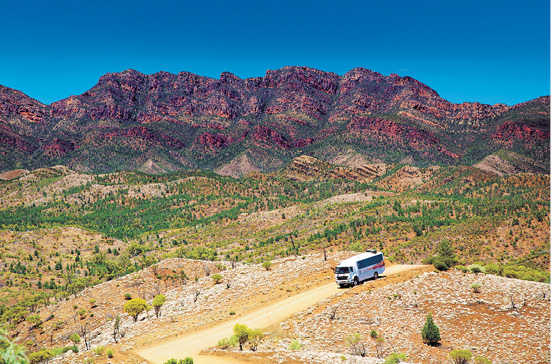
“We are dedicated to continuing to being the leaders of domestic travel,” Hall said, noting APT’s strong pedigree in the sector after winning Best Domestic Tour Operator at the National Travel Industry Awards for seven of the eight past years. “It is in our DNA to always be the best,” he added.
The industry can also expect to see more domestic innovation from APT in the coming months, with Hall confirming the company was in ongoing discussions about domestic small ship cruising. One of its vessels remains in local waters and can potentially be deployed for Australian itineraries as soon as the Government gives the green light.
Creative Hire
Getting really creative
The complete shutdown of the business events sector left exhibition rental company Creative Hire and its sister company DisplayWise reeling. Suddenly there was no demand whatsoever for their services, so Managing Director Tim Russell put his thinking cap on and in a true pivot created a new business which hopefully will fill an important role in the post-coronavirus world.
Utilising the company’s existing expertise in industrial design and manufacturing, BARE Hygiene was born, giving a new stylish option for businesses and venues to meet the COVID-19 requirements for hand sanitisation.
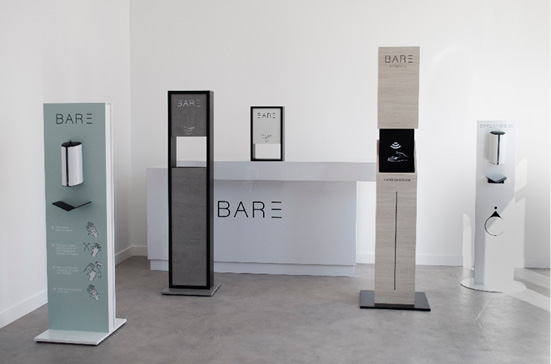
“We saw a need for well-designed hand sanitisation units that would suit premium venues and locations, including corporate offices, retail spaces, restaurants, cafes and hotels,” Russell said.
But it’s not all just about filling in while COVID-19 restrictions are in place. “We also wanted to create solutions that we could incorporate into our exhibition hire range, so as events start to return, conference organisers have premium solutions ready to use within their events,” he added.
The BARE Hygiene range offers a wide variety of looks, branded as Contemporary, Endure, Vogue and Luxe with freestanding, countertop and wall-mounted options. All units come in a choice of premium finishes and can be custom branded. Customers are able to purchase them outright or simply hire them on a short-term basis.
Russell said the company hopes to return to its core exhibition and events business as soon as possible, and was already working proactively with some clients to plan for the industry’s reopening as restrictions are eased.”However with hand sanitisation expected to be a health recommendation for many years to come, BARE Hygiene will become another core service area of the business and here to meet market demand for the long-term,” he said.
Australia and Beyond Holidays
Switching tack
Australia & Beyond Holidays is another of the many businesses which has had to pivot its model to survive.
“We were doing inbound, we did it very well, we did over 500 groups per year inbound to Australia, that all stopped of course, and we’ve pivoted to domestic,” explained Managing Partner Simon Bernardi.
Despite the headwinds, the company has reported early indications of success.
“We’ve had 100 travel agents sign up to use our system, and 200 on our new Facebook page for Australian agents and suppliers, and we’re getting more enquiries offline as well.”
Bernardi hailed the fortunate position his company was in, as a business-to-business operator, which was able to offer most of its products and services directly to Australian agents, capitalising on a potentially lucrative domestic boom.
“When you’re a wholesaler who sells international, you don’t have the experience a lot of our staff do,” Bernardi said.
“You’ve got this pent-up demand with people who have got significant spend, probably have Australia on their bucket list but want to travel the world…now is a great time to get those people doing those bucket list things they’ve always wanted to do in Australia and spending that money.
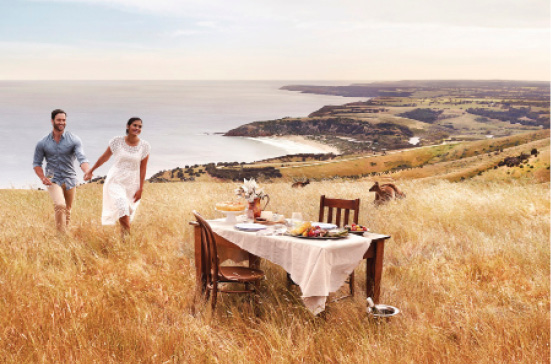
“That’s why we do the homemade journeys…people who want to do a bucket list thing want more value, they want high-end stuff, inclusions, and they want to do stuff different.”
With agents also having to narrow their focus on domestic, Australia & Beyond’s platform is now offering the opportunity for that to take place.
“We have an FIT booking system, but we also have a handmade section where we can put together family groups and create the itineraries the way people want them, and by doing that you create more value. They tend to cost more, and they’re bigger commission items, where they’ve got potential to earn more money.
“We offer net pricing so travel agents can do their own mark-ups, they can book in the system, they can hold product…if it’s a big itinerary, they can send it to us, and we’ll see if we can source a larger commission through direct contracts we’ve got, or make some other suggestions.
“We don’t want to get hundreds of thousands of bookings, but we want to get higher-value bookings so the agents can earn some money and the customers can get more value.”
The Travel Corporation
Leveraging your position
Pivoting its products to the new reality was a major challenge for The Travel Corporation — but the multi-faceted business did have a key advantage in the form of its home grown existing AAT Kings domestic operation. However with iconic brands like Insight and Trafalgar having a well-established clientele used to exploring Europe or the Americas, there was still a lot of work to be done to meet expectations in the development of new products that would appeal in travellers’ own back yards.
Although part of the TTC umbrella, each brand has a very different identity, and for Insight Vacations in particular it was important to offer customers “everything they know and love about insight, now closer to home”. Managing Director Karen Deveson said while operations in Australia and New Zealand are being conducted in partnership with AAT Kings, the brand’s new range of Local Escapes was actually developed by Insight’s travel experiences team in Europe.
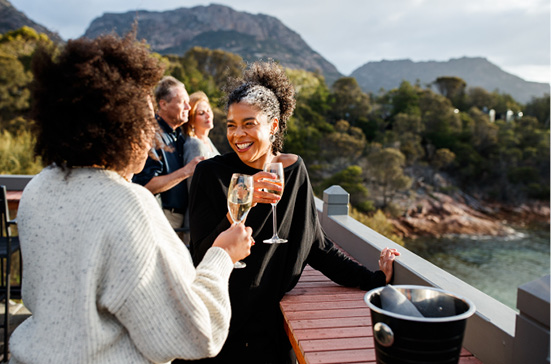
Three Australian trips are on offer — naturally shorter than the extended journeys popular overseas — and there are also two new Insight New Zealand itineraries which hopefully will be accessible by Aussies as the proposed “travel bubble” is implemented. Based on customer feedback the journeys also incorporate intimate food and wine experiences as well as opportunities to “give back” to communities impacted by natural disasters.
Interestingly, Deveson also cited internal research which found Insight customers were surprisingly unaffected financially by the COVID-19 pandemic. A significant proportion said they were willing, ready and able to travel, with 60% keen to take a domestic trip before the end of 2020.
Trafalgar’s new domestic range, unveiled by outgoing MD Jason Wolff, complements its existing Australia and New Zealand program with a “Near not Far” limited series featuring three seven-day trips. Although many Aussies are naturally familiar with their own country, Trafalgar is promising to take guests “beyond the farm gate” and offer experiences with local landowners and providores.
The great news for travel agents is that because the new products are part of The Travel Corporation stable, customers who are holding travel credits now have an opportunity to use them up on travel this year rather than having to defer their trips for another 12 months as the pandemic subsides.
Intrepid
Going local globally
Intrepid Travel believes the COVID-19 pandemic will usher in a new era of “slow and grounded travel,” with a real desire from travellers to engage with local communities and undertake activities close to home. Despite the closure of borders and cessation of most travel activity, there’s been no downtime whatsoever for the company’s Asia-Pacific Managing Director, Sarah Clark, who while sheltering in her home state of Tasmania, has been undertaking the development of the new Intrepid Local range as Global Project Lead.
Clark told travelBulletin “we wanted to create a product range for locals by locals, that would not only bring travellers back together after months of isolation, but also give them a way to support their own communities and businesses rebounding from the pandemic”. Rather than just being focused on Australia, the new range has trips across the globe meaning locals in key source markets can now more easily experience their own back yard. In fact with a network of DMCs across the globe Intrepid is well placed to engage with travellers in many countries, and had even trialled offering close-to-home product with locals in Vietnam, Clark said.

The new range comprises more than 75 multi-day adventures, each developed to empower and support local economies during the recovery, in line with Intrepid’s values of using travel as a force for good.
There’s also a new “Intrepid Retreats” travel style, in which groups immerse themselves in a single location, staying in handpicked accommodation, to undertake daily activities such as hikes, farm visits and wine tasting.
Intrepid’s post-COVID recovery plans also feature its extensive global range of Urban Adventures day tours, while the company is also set to ramp up its tailormade and private group product range for travellers wanting a customised version of Intrepid group tours.
Crooked Compass
Turning closer to home
Boutique tour operator Crooked Compass sprung into action to launch product for Australia, and then New Zealand after COVID-19 deemed all its international small group tours inoperable due to global border closures. “We have had to stand down incredible staff, and the financial impact on the remote communities we support is heartbreaking,” Founder and Director Lisa Pagotto told travelBulletin. “We were set for our biggest year yet, only to have our own growth curve flattened by the impact of COVID.”
In May, Crooked Compass Australia made its debut, offering product designed to show travellers a side of the country “they wouldn’t even dream existed”. Itineraries are shorter in length — ranging from four to eight days — and initially covered Tasmania and NSW, before expanding to Queensland, the NT and SA. In Tasmania, experiences included a visit to a family which owns the private property which is where European explorers first made land contact with the island state and its first people. The launch was followed in June by three New Zealand itineraries, covering the North Island, South Island, or offer the option to combine the two.
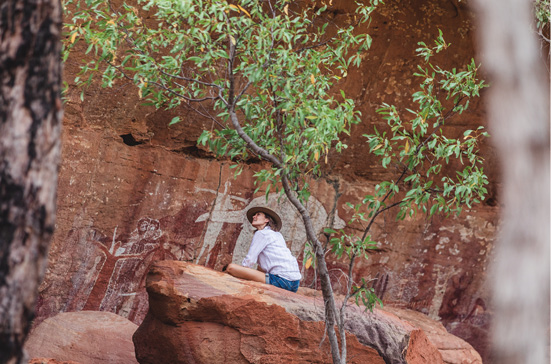
The need to turn around the new portfolio in a shorter-than-usual period required Crooked Compass to “work smarter”, but the company found that many local partners were eager to help develop the product at a much faster pace. Pagotto said innovation from both parties was fuelled by a need to stay ahead of a changing landscape and a want to be ready for when the bounce back began. “There have been challenges in replicating our traditional style of international travel within Australia/NZ, however, we have been able to procure some incredible journey’s that highlight phenomenal experiences right across the region,” she added.
Pagotto said there are plenty of opportunities for agents to sell domestic, but recommended they delve into what type of domestic travel they want to sell. “As with international travel, you can’t be everything to everyone and whatever you are passionate about will sell over anything else,” she explained. “It is all about re-discovering your style and passion within a domestic landscape and demonstrating the value an agent can bring to co-ordinating clients travel needs. In a tough time like this, where delivering a service above and beyond (despite the exhaustion everyone currently feels), will shine through when consumers are nervous and need their confidence restored.”


